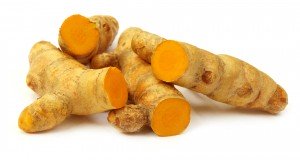 Is turmeric really the next miracle drug? What is it and why is it so important to our health?
Is turmeric really the next miracle drug? What is it and why is it so important to our health?
Turmeric is a rhizomatous plant of the ginger family, so you use the bulb just like you do ginger. It is generally grown in India and it’s used prolifically in Indian cuisine as well as in food colourings and dying. When not used fresh, the rhizomes are boiled, dried and then ground into a deep orange-yellow powder. Turmeric has a distinctly earthy, slightly bitter, slightly hot peppery flavor and a mustardy smell. It’s main ingredient, curcumin, also responsible for its bright yellow colouring, is at the root of the purported health benefits of turmeric (pun intended).
Turmeric is a great spice addition to your dishes, but be warned it does tend to stain everything yellow. You can prevent most of this by cleaning everything immediate after use especially by using a vinegar bath to reduce staining. It might even be helpful to get a separate set of cooking implements specifically for your curries and dishes containing turmeric. You can buy turmeric in pill form instead, but like all spices and herbs their health benefits are better when it’s used and digested normally rather than as a supplement.
Following is a list of the main 9 health benefits of turmeric, and why you should include it in your diet:
1. Weight Management and Digestion:
You’ll be interested to know that one of the main health benefits of turmeric is its ability to help control your weight. It does this by increasing your metabolism. Specifically it’s the curcumin in turmeric that stimulates the gallbladder and produces bile, which improves digestion and helps digest fat. Studies have found it treats indigestion by reducing symptoms of bloating and gas.
In fact research suggests that curcumin may provide an inexpensive, well-tolerated, and effective treatment for inflammatory bowel disease (IBD) such as Crohn’s and ulcerative colitis. Researchers believe curcumin achieves these effects due to antioxidant activity as well as inhibition of a major cellular inflammatory agent called NF kappa-B. More importantly this component of turmeric was effective at a concentration as low as 0.25 per cent, an amount easily ingested by simply enjoying turmeric in flavorful curries.
2. Happiness Agent:
The health benefits of turmeric have been used in Chinese and Ayurvedic medicine for literally thousands of years, including as a treatment for depression. More recently researchers with the Department of Pharmacology of Government Medical College in Bhavnagar, Gujarat, India performed a clinical study comparing the effects of 1000-mg curcumin from turmeric and Prozac (20-mg fluoxetine). The study determined turmeric was as effective as Prozac in treating major depressive disorder without the dangerous side effects often found in Prozac use.
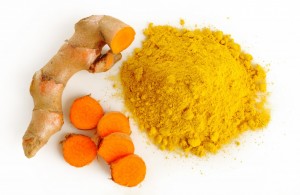 3. Heart Health Promoter and Stroke Suppressor:
3. Heart Health Promoter and Stroke Suppressor:
Preventing oxidation in the body is the key to preventing coronary disease, heart attack and stroke. Curcumin may be able to prevent the oxidation in the body, specifically related to cholesterol, helping to stop the build-up of LDL (“bad” cholesterol) in the blood vessels. Turmeric is also a good source of vitamin B6, which is vital in keeping homocysteine levels (a cellular process byproduct) from getting too high.
In research published in the Indian Journal of Physiology and Pharmacology, when 10 healthy volunteers consumed 500 mg of curcumin per day for 7 days, not only did their blood levels of oxidized cholesterol drop by 33%, but their total cholesterol dropped 11.63% , and their HDL (good cholesterol) increased by 29%.
4. Anti-Inflammatory Agent:
Inflammation is simply the body’s natural response to injury or infection, often causing localized redness, swelling, or heat. Whether it’s temporary or chronic inflammation, the health benefits of turmeric may be able to naturally alleviate the symptoms.
Studies have shown that turmeric is a natural painkiller and may help in the treatment of psoriasis and other inflammatory skin conditions, particularly as it speeds up wound healing and assists in the remodeling of damaged skin. When researching how curcumin works, researchers also found curcumin prevents the formation of the inflammatory chemical cyclooxygenase-2 (COX-2). The curcumin in turmeric was also able to neutralize free radicals, important in many diseases, such as arthritis, where free radicals are responsible for the painful joint inflammation and eventual damage to the joints. Turmeric’s combination of antioxidant and anti-inflammatory effects explains why many people with joint disease find relief when they use the spice regularly.
In a recent study of patients with rheumatoid arthritis, curcumin was compared to phenylbutazone and produced comparable improvements in shortened duration of morning stiffness, lengthened walking time, and reduced joint swelling. Early research shows it may help with inflammation of the eye (uveitis), inflammatory bowel disease (ulcerative colitis) and multiple sclerosis (see below). Whilst further research needs to occur it is thought that turmeric’s natural anti-inflammatory qualities mean it may work just as well as some anti-inflammatory medications, without the side effects.
5. Liver Love:
A recent study reported that “turmeric may increase detoxification systems in addition to its anti-oxidant properties.” Specifically the study was conducted to evaluate the effects of turmeric on the liver’s ability to detoxify xenobiotic (toxic) chemicals. It found the levels of two very important liver detoxification enzymes (UDP glucuronyl transferase and glutathione-S-transferase) were significantly elevated in those fed turmeric as compared to controls.
When researching how curcumin works, researchers also found it induces the formation of a primary liver detoxification enzyme, glutathione S-transferase (GST) enzymes. Test subjects given curcumin for 14 days showed at 16% increase in the liver’s production of GST, and malondialdehyde (a measure of free radical damage) decreased by 36%.
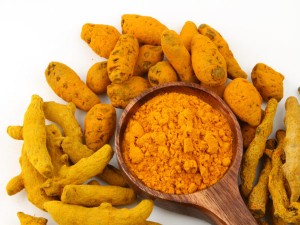 6. Multiple Sclerosis Reliever:
6. Multiple Sclerosis Reliever:
In Asian countries, such as India and China, where foods spiced with curcumin-containing spices like turmeric are common fare, reports of MS are extremely rare. It was thought that curcumin may block the progression of multiple sclerosis by interrupting the production of IL-2. IL-2 is a protein that signals for the development of neural antigen-specific Th1 cells, immune cells that then launch an attack on the myelin sheath which protects the body’s nerves.
In a recent study with the experimental autoimmune disease EAE, researchers gave animal test subjects (mice) injections of 50 and 100-microgram doses of curcumin three times per week over a period of 30 days, and then watched the mice for signs of developing MS-like neurological impairment. By day 15 those who had not received curcumin developed EAE to such an extent that they displayed complete paralysis of both hind limbs. Those given the 50-microgram dose of the curcumin showed only minor symptoms and those given the 100-microgram dose appeared completely unimpaired. And the good news is the doses of curcumin that protected the mice against the development of EAE were roughly equivalent in human terms to those found in a typical Indian diet.
7. Cystic Fibrosis Fighter:
Cystic fibrosis is a fatal disease afflicts about 70,000 children and young adults worldwide who rarely survive beyond 30 years of age. It attacks the lungs with a thick mucus, causing life-threatening infections, damages the pancreas and interferes with the body’s ability to digest and absorb nutrients.
Researchers now know that cystic fibrosis is caused by mutations in the gene that encodes for the transmembrane conductance regulator, a protein known as CFTR. Under normal circumstances it travels to the cell’s surface and creates channels through which chloride ions can leave the cell. However faulty genes cause the protein to be abnormally shaped thereby preventing it’s function and leading to a build up of chloride in the cells resulting in mucus production.
An animal study published in the Science (April 2004) suggests that curcumin can correct the most common cystic fibrosis mutation, which is called DeltaF508. When mice with this DeltaF508 defect were given curcumin it corrected this defect, resulting in a DeltaF508 protein with normal appearance and function. Further studies at Yale have also shown curcumin can inhibit the release of calcium, thus allowing mutated CTFR to exit cells via the calcium channels and helping to prevent build up of chloride-driven mucus.
Researchers are still determining the correct doses for human trials as well as any adverse reactions with cystic fibrosis medications, and warn that patients should not self-medicate with dietary supplements containing curcumin. However adding more turmeric to your diet may yield some benefits.
8. Cancer Fighter:
The most promising and wide-ranging health benefit of turmeric is its potential to fight, and prevent a range of cancers including colon cancer, prostate cancer, childhood leukemia and generally inhibiting cancer cell growth and metastases. If this is true then turmeric could be the panacea we’ve been looking for.
It’s the antioxidant action of curcumin and its ability to protect cells from free radicals that can damage cellular DNA that’s at the root of these claims. This is particularly promising for the treatment of colon cancer where cell turnover occurs every three days. Cancer cells can form much more quickly in the colon due to this rapid turnover of cells where mutations in the colon cell DNA can result. Research published in the August 2006 issue of Clinical Gasteroenterology and Hepatology reported that curcumin reduced both the size and number of precancerous lesions in the human intestinal tract. In another study researchers concluded, “The results show that curcumin mixed with the diet achieves drug levels in the colon and liver sufficient to explain the pharmacological activities observed and suggest that this mode of administration may be preferable for the chemoprevention of colon cancer.”
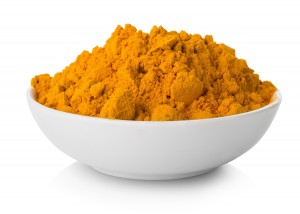 Interestingly curcumin may also helps the body to destroy mutated cancer cells by enhancing liver function, inhibiting the synthesis of a protein thought to be instrumental in tumor formation and preventing the development of additional blood supply necessary for cancer cell growth. All this means curcumin prevents cancer cells from spreading through the body where they can cause more harm.
Interestingly curcumin may also helps the body to destroy mutated cancer cells by enhancing liver function, inhibiting the synthesis of a protein thought to be instrumental in tumor formation and preventing the development of additional blood supply necessary for cancer cell growth. All this means curcumin prevents cancer cells from spreading through the body where they can cause more harm.
But colon cancer’s not the only target for curcumin. A recent study reported “… that turmeric may increase detoxification systems in addition to its anti-oxidant properties… Turmeric used widely as a spice would probably mitigate the effects of several dietary carcinogens” including breast cancer. In a recent study, published in Biochemical Pharmacology (September 2005), human breast cancer cells were injected into mice, and the resulting tumors removed to simulate a mastectomy, after which mice were given no treatment, the cancer drug paclitaxel (Taxol), curcumin or a mixture of Taxol and curcumin. After five weeks, only half the mice in the curcumin-only group and just 22% of those in the curcumin plus Taxol group had evidence of breast cancer that had spread to the lungs, compared with 75% of the mice that got Taxol alone and 95% of the control group developed lung tumours, proving that curcumin is a breast cancer fighting agent. In fact lead researcher, Bharat Aggarwal reported “Curcumin acts against transcription factors, which are like a master switch. When we turn them off, we shut down some genes that are involved in the growth and invasion of cancer cells.”
But the health benefits of turmeric don’t stop there. In a study published in Biochemical Pharmacology (September 2005, University of Texas laboratory researchers studied human non-Hodgkin’s lymphoma cells. They showed that curcumin inhibits the activation a regulatory molecule, known as of NF-kappaB. NF-kappaB signals genes to produce a range of inflammatory molecules (including TNF, COX-2 and IL-6) that promote cancer cell growth. The study also showed curcumin suppressed the spreading of cancer by causing cancerous cells to suicide in the lungs. It’s early days but the University of Texas is conducting phase 1 clinical trials and are also looking into curcumin’s chemopreventive and therapeutic properties for multiple myeloma and pancreatic cancer. Other research groups are investigating curcumin’s effects on oral cancers.
And let’s not forget prostate cancer. Scientists tested the effects of curcumin and phenethyl isothiocyanates (a phytochemical abundant in cruciferous vegetables including cauliflower, cabbage, broccoli, Brussels sprouts, kale, kohlrabi and turnips) on prostate cancer. When tested singly they found both phenethyl isothiocyanate and curcumin greatly retarded the growth of human prostate cancer cells. But when it came to well-established prostate cancer tumors it was only when the two were combined that they significantly reduced both tumor growth and the ability of the prostate cancer cells to spread or metastasize.
9. Alzheimer’s Preventer:
Move over cancer, dementia is the new kid on the block when it comes to our ailing health in old age. As of 2013, there were an estimated 44.4 million people with dementia worldwide and it is expected that this number will increase to an estimated 75.6 million by 2030.
Alzheimer’s disease results when a protein fragment called amyloid-B, a protein fragment snipped from another protein called amyloid precursor protein (APP). In a healthy brain, these protein fragments are broken down and eliminated. In Alzheimer’s disease, the fragments accumulate, producing oxidative stress and inflammation and forming hard, insoluble plaques between brain cells. It’s believed the health benefits of turmeric may prevent and slow the progression of Alzheimer’s disease by removing these amyloid plaque buildups in the brain.
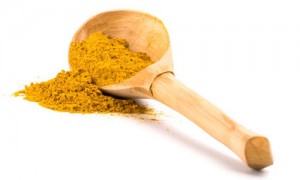 Studies of elderly Indian populations whose diet turmeric is a common spice show very low levels of neurological diseases such as Alzheimer’s. It is thought that oxidation in the brain is a major factor in aging and responsible for neurodegenerative disorders and dementias including Alzheimer’s disease. Research published in the Italian Journal of Biochemistry (December 2003) suggests curcumin induces a protective system (called the heme oxygenase pathway) which when triggered in brain tissue, causes the production of the potent antioxidant bilirubin, which protects the brain against oxidative (free radical) injury.
Studies of elderly Indian populations whose diet turmeric is a common spice show very low levels of neurological diseases such as Alzheimer’s. It is thought that oxidation in the brain is a major factor in aging and responsible for neurodegenerative disorders and dementias including Alzheimer’s disease. Research published in the Italian Journal of Biochemistry (December 2003) suggests curcumin induces a protective system (called the heme oxygenase pathway) which when triggered in brain tissue, causes the production of the potent antioxidant bilirubin, which protects the brain against oxidative (free radical) injury.
Further research by UCLA has shown that curcumin inhibits amyloid-B aggregation and dissolves amyloid fibrils more effectively than the anti-inflammatory drugs ibuprofen and naproxen. Researchers found that curcumin crosses the blood brain barrier and binds to small amyloid-B species, preventing them from clumping together to form larger plaques. And another study revealed turmeric’s most active ingredient, bisdemethoxycurcumin, actually boosts macrophage activity to normal levels in Alzheimer’s patients, helping them to clear existing amyloid beta plaques.
Dosage and Side Effects:
The recommended daily dose of turmeric powder is 500-mg. To minimize side effects avoid doses in excess of 1500-mg. Fresh turmeric roots can be taken in a dose of up to 3-grams.
Excessive or inappropriate intake of turmeric can lead to a range of mild conditions including allergic reaction, gallbladder problems, stomach and gastrointestinal problems, Bleeding, Liver Problems, drug interactions and uterine contractions. Pregnant women and those with such conditions should minimise intake of turmeric. It should also be stopped 2 months prior to any surgery due to its interference with blood clotting.

